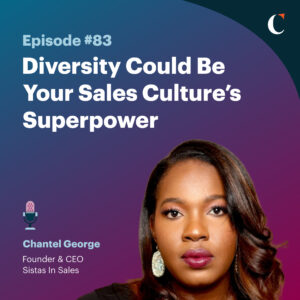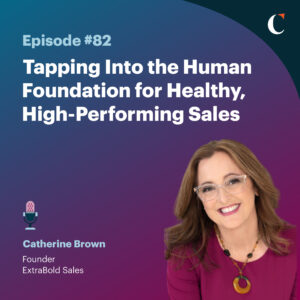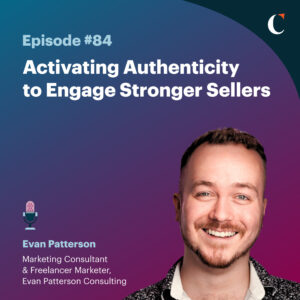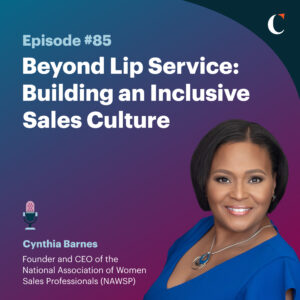Leaders who want to foster a healthy sales culture face a mountain of advice and pretty terrible examples (Always Be Closing, anyone?).
When your pipeline is in peril and your top performer threatens to leave, it’s easy to push down concerns about culture.
But that’s short-sighted. Building diversity, equity, inclusion, and belonging (DEIB) into your sales team’s culture is a smart business practice and the right thing to do.
In this post, we’ll share essential perspectives from four expert Winning The Challenger Sale podcast guests. Their straightforward advice makes the case for creating an inclusive sales culture and offers practical, hands-on advice intentional leaders can use today.
Why is DEIB Important?
DEIB refers to diversity, equity, inclusion, and belonging. When we talk about creating healthy, high-performing sales cultures, we must include initiatives that create space for everyone to thrive. The principles of DEIB provide a roadmap for getting there.
There are so many good reasons to strive for an inclusive sales force—not the least of which is its impact on pipeline and revenue. When we invited four DEIB experts onto Winning The Challenger Sale to share their perspectives, each pointed to a solid business case for intentionally, authentically pursuing DEIB initiatives.
Because ignoring it leaves money on the table
The highest-performing sales reps teach their prospects a new way of thinking about a problem. They can’t get there without investigating different perspectives.
“Unless we are attacking the problem in a 360-degree way by getting different voices, opinions and lived experiences into the room, we are most likely leaving money on the table,” said Chantel George, founder and CEO of Sistas in Sales and our guest for Episode 83: Diversity Could Be Your Sales Team’s Superpower.
Because healthy, inclusive cultures breed sales success
“Like a lot of other things in life, the success [of sales] depends on what’s in our head,” Catherine Brown, founder of ExtraBold Sales, said. Catherine joined the podcast for Episode 82: Tapping Into the Human Foundation for Healthy, High-Performing Sales.
Coaching sellers is essential to helping them move past the individual blockers that are holding their performance back. We can only get there, Catherine says, by helping them navigate around stereotypes and assumptions.
Because simply paying lip service to DEIB issues isn’t enough
When you pursue DEIB for the right reasons, that authenticity shines through. The opposite is true, as well.
“Marketing is only going to be effective if you’re being authentic,” Evan Patterson of Evan Patterson Consulting said. “You can get a lot of clout, business and pipeline really quickly by lying and deceiving, but you cannot sustain that. The truth will come out.”
Evan joined us for Episode 84: Activating Authenticity to Engage Stronger Social Sellers.
“If you’re going to do things, whether as an individual or a company, make sure it’s something you’re doing because you want to do it,” Evan said.
Because it matters to your customers
The ripple effects of pursuing DEIB on your sales team go beyond your sellers’ experience. As Cynthia Barnes, founder and CEO of the National Association of Women Sales Professionals (NAWSP), shared on Episode 85: Beyond Lip Service: Building an Inclusive Sales Culture, your prospects want to see an investment in DEIB it, too.
“There are social media groups where people say, ‘I wouldn’t buy from this company, because they don’t have anyone who looks like me.’ If someone were to call your company and say, ‘I want to have a rep who looks like me,’ would you be able to accommodate?” Cynthia said. “It matters to your customer.”
Expert Tips for Building an Inclusive Sales Culture
Now that you’re bought in, how do you pursue a more inclusive sales culture in your organization? Read on for our guests’ most actionable tips.
1. Rethink your hiring approach with inclusion in mind
So, what happens when you want to recruit more diverse candidates for roles in leadership but “don’t have anyone in the pipeline?”
“I’ve heard that too many times,” Cynthia Barnes said.
Barnes, who trains recruiters to hire diverse talent, recommends spending time prospecting into the right communities:
- Familiarize yourself with historically Black colleges and universities (HBCUs) and connect with their alumni organizations to source highly skilled talent.
- Look to chapters of the National Panhellenic Council, or “Divine Nine” sororities and fraternities, to find highly skilled Black professionals in your city.
Hiring diverse talent starts with reaching the right candidates. If you “don’t have pipeline,” Cynthia says, you’ll need to go find it.
2. Examine stereotypes holding sellers back
Sales stereotypes—those pushy, sleazy, aggressive and cheesy sellers—pop up everywhere. They’re so pervasive that customers, internal teams, and even sellers themselves hold onto them.
Building a healthy sales culture within your organization begins with changing the way sellers see their jobs, says Catherine Brown.
“You have to have a good perspective about selling and believe selling is something you’re really doing for someone and not to or at them,” she said.
To change your sellers’ perspective, take a step back:
- Admit you have a problem
-
- Find out what’s wrong before you move toward trying to fix it. These problems might be individual—and rooted in individual experience—so you’ll only uncover them by talking with your team.
- Actively reframe assumptions
-
- Sellers must learn to see themselves as customer guides. This reframe can be hugely impactful for sellers.
- Focus on leadership and personal development
-
- Coaching 1:1 is the only way to help sellers move past their individual blockers.
- Coach and influence beyond the sales team
-
- If assumptions are organization-wide, how can you begin to reframe with other teams?
These mindset shifts sound simple, but Brown says they help sellers get out of their own way and focused on meeting their goals.
3. Create psychological safety with your sellers
The best leaders don’t build a mini army of sales reps with the same skills and strategies as themselves. Instead, they build a healthy culture of psychological safety in which each rep feels empowered to leverage their unique skillsets and show up as the best version of themselves, says Chantel George.
Chantel’s quick activity:
- Grab a blank sheet of paper
- Write down the names of every rep on your team
- List 1-2 of each rep’s superpowers
Were you able to list something for every seller? If not, it might be time to focus on fostering more vulnerability with those you’re coaching.
“You have to give people the ability to be themselves,” George said. “I really do want sales leaders to trust sellers a bit more, have more dialogue with them and understand what their secret sauce truly is.”
4. Make the move from equality to equity with this question
To foster a healthy, high-performing, diverse work environment for your sales team, focus on equity—not equality—first.
“Equality is when you give everyone the same number of resources to do something,” Evan Patterson said. “Equity is when you give certain people who are already starting at a disadvantage additional resources to catch them up.”
Moving from equality to equity isn’t always easy, especially when you likely have individuals on your team struggling with challenges you’ve never faced before. But the shift can begin by asking your team members one simple question: What do you need for this to be easier or better?
“You can’t fix the world’s problems, but you educate yourself so when you see it happening, you can do something about it, or figure out who can,” Patterson said. “Create space for open conversations and remind yourself you don’t have to have all the answers—just be willing to find them.”
Listen to Winning The Challenger Sale for more
Building an inclusive sales culture takes time and intentionality. As you navigate changes within your organization, our expert guests’ advice can provide inspiration, perspective, and actionable steps forward.
On the Winning The Challenger Sale podcast, we talk with experts from the world of sales and marketing to uncover insights just like these. Find it on our website, Apple Podcasts, Spotify, or just search for it in your favorite podcast player.
Andee Harris
Andee Harris is CEO of Challenger. Andee brings more than two decades of experience growing and scaling service and technology businesses. She has previously led multiple companies, both as CEO and Senior Vice President, through periods of rapid revenue growth, critical fundraising, and successful acquisition. These companies include Highground (acquired by Vista Equity Partners), TMBC (acquired by ADP), Syndio and Emerging Solutions (acquired by Emtec).
More from our blog
3 Challenger Skills That Boost Sales Rep Productivity and Motivate Buyers
Sales leaders everywhere are looking for ways to improve sales rep productivity. But productivity isn’t just about efficiency—it’s about…
Sending Commercial Teaching Messages That Inspire Action—Not Anxiety
How to Build Tension in Your Commercial Teaching Message In B2B sales, the most powerful messages aren’t horror stories, they’re dramas with a clear…
The Next Era of Challenger Selling: Skills That Will Shape the Future of Sales
In 2020, selling changed overnight. Buyers went quiet, priorities flipped, and digital interactions replaced boardroom handshakes. Everyone talked…
What are you waiting for?
Transform your sales team.
The best companies grow, and grow fast, by challenging customers, not by serving them.








